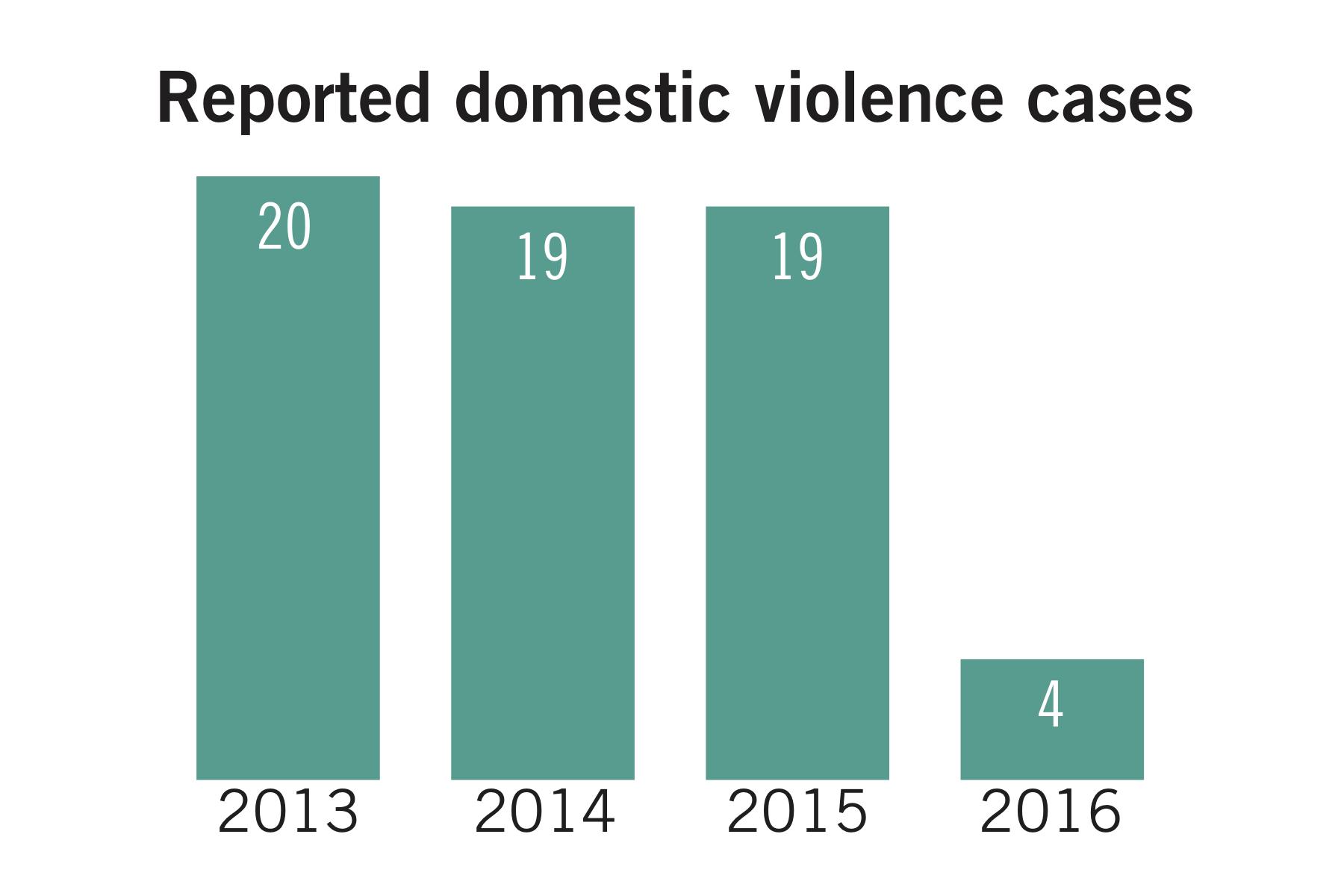
Graphic by Yonah Bromberg Gaber | Graphics Eidtor
Source: GW Annual Security Report
The number of domestic violence cases on campus declined sharply last year.
Just four cases of domestic violence were documented on the Foggy Bottom Campus in 2016, compared to 19 in both 2015 and 2014, and 20 in 2013, according to annual security reports, the most recent of which was released Friday. Experts said because domestic violence cases are widely unreported on campuses, the number of documented cases is likely to be much lower than the number of incidents actually occurring at the University.
Darrell Darnell, the senior associate vice president for safety and security, declined to give a specific explanation for why the number of cases would drop in the last year but said the University has tried to improve education about domestic violence though a number of support programs and resources.
“We’ve done everything we can to educate people and make it easily accessible to make people available to those resources,” Darnell said in an interview last week.
Darnell cited programs like the University’s Haven website that lists the mandatory trainings required for incoming undergraduate students. Last year, the University readjusted its mandatory in-person sexual assault trainings by creating individualized lessons to peak student interest.
On Haven, student groups can also request workshops on Title IX education and view prevention tips. Employees can also review their reporting responsibilities.
Darnell said more students will report incidents if they are comfortable with authorities and trust that officials will be able to handle cases appropriately.
“Again my first priority is reporting a physical and mental well-being of the survivor and I think that as a University we’ve taken that very seriously,” he said.
The number of recorded rapes on the Foggy Bottom Campus has stayed relatively consistent over the past three years with 25 recorded last year, 21 in 2015 and 24 in 2014, according to the report.
On the Mount Vernon Campus, recorded rapes have rose to seven last year from two in 2015, according to the report.
Some experts said it’s difficult to know whether the drop in domestic violence cases is significant because the number of recorded cases has been consistently low and in prior years, universities weren’t required to document domestic violence cases. Beginning in 2014, universities were required to report dating violence, domestic violence and stalking under the Violence Against Women Act.
But other experts said the decrease could indicate that students are less comfortable filing domestic violence reports to campus authorities.
Aran Mull, the deputy chief of police at the University of Albany, said the reduction could be attributed to either a lower number of cases or more effective programs used to educate students about domestic violence.
To encourage more students to come forward with incidents, officials must give students the chance to learn about the differences between healthy and unhealthy relationships, to help students know when to go to authorities, Mull said.
“We’re not talking about huge numbers to begin with so small changes in the culture could have a pretty significant impact,” he said.
The Metropolitan Police Department responded to three of the four domestic violence cases recorded at GW last year, compared to six of 19 in 2015, according to the security report. The University Police Department only handled one domestic violence case last year, according to the report.
D.C. universities recorded similar numbers of domestic violence incidents. American University documented four cases on its main campus in 2016, while no domestic violence cases were reported at Georgetown University in 2016 or 2015, according to security reports from those institutions.
Shannon Lane, an associate professor in social work at Adelphi University, said students usually do not report sexual violence crimes including domestic violence, rape and dating violence. Since males are typically perceived as perpetrators of those crimes, survivors of domestic violence that are male or in a same-sex relationship may not recognize that they are being abused.
“I would love to think as a proud alum of GW I would love to think that our university had solved this problem on campus and that only four people were victims of it this year, but I think realistically that’s probably untrue,” she said.
Laura Egan, the director of training and technical assistance at the Clery Center, which focuses on university requirements to publish security information, said universities need to advertise how students can go about reporting an incident and that students have a right to request to change classes or a housing assignment to avoid contact with a sexual violence perpetrator.
“The more you educate the community about signs of abuse in a relationship the more likely they are to become aware of what they might be experiencing if it’s something they should report,” she said.
Jackie Torrez and Pann Myat Phyu Sin Myo contributed reporting.



